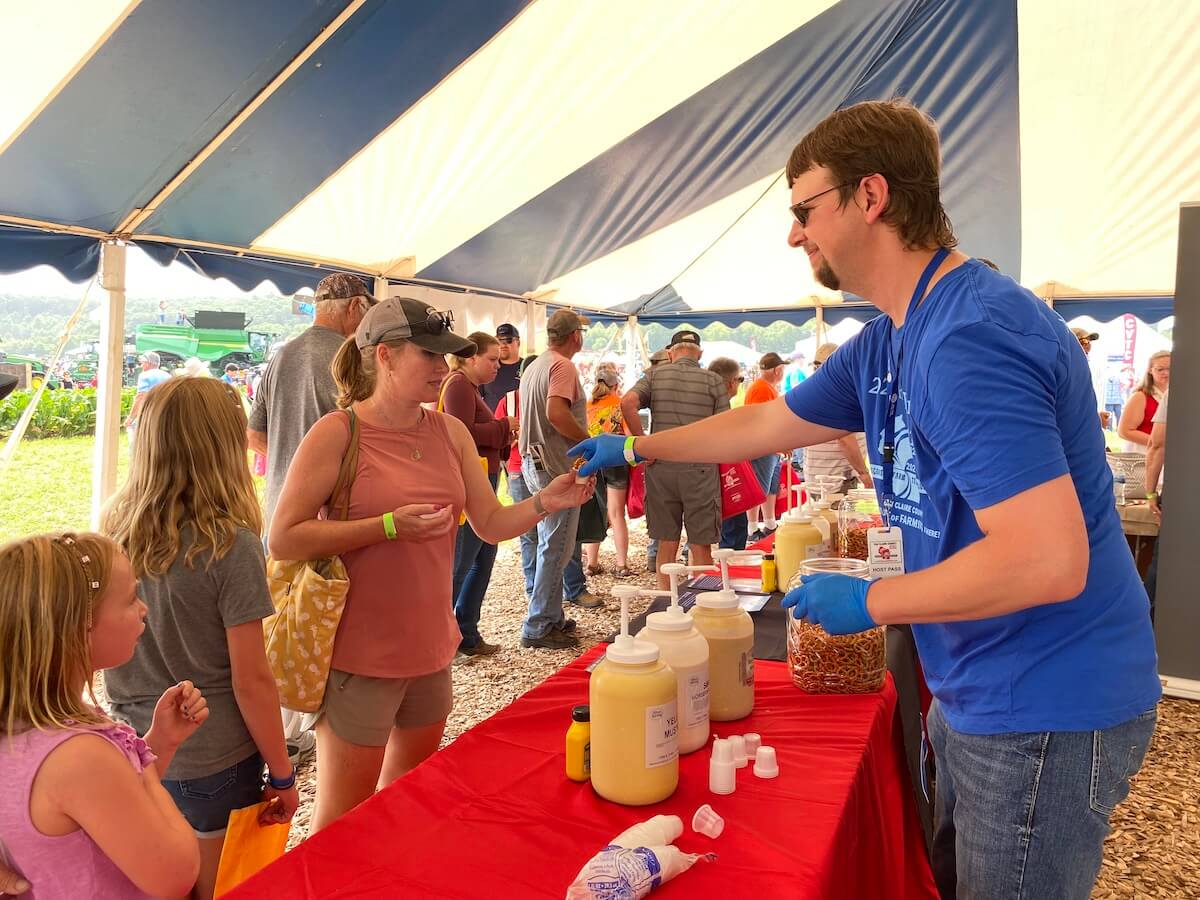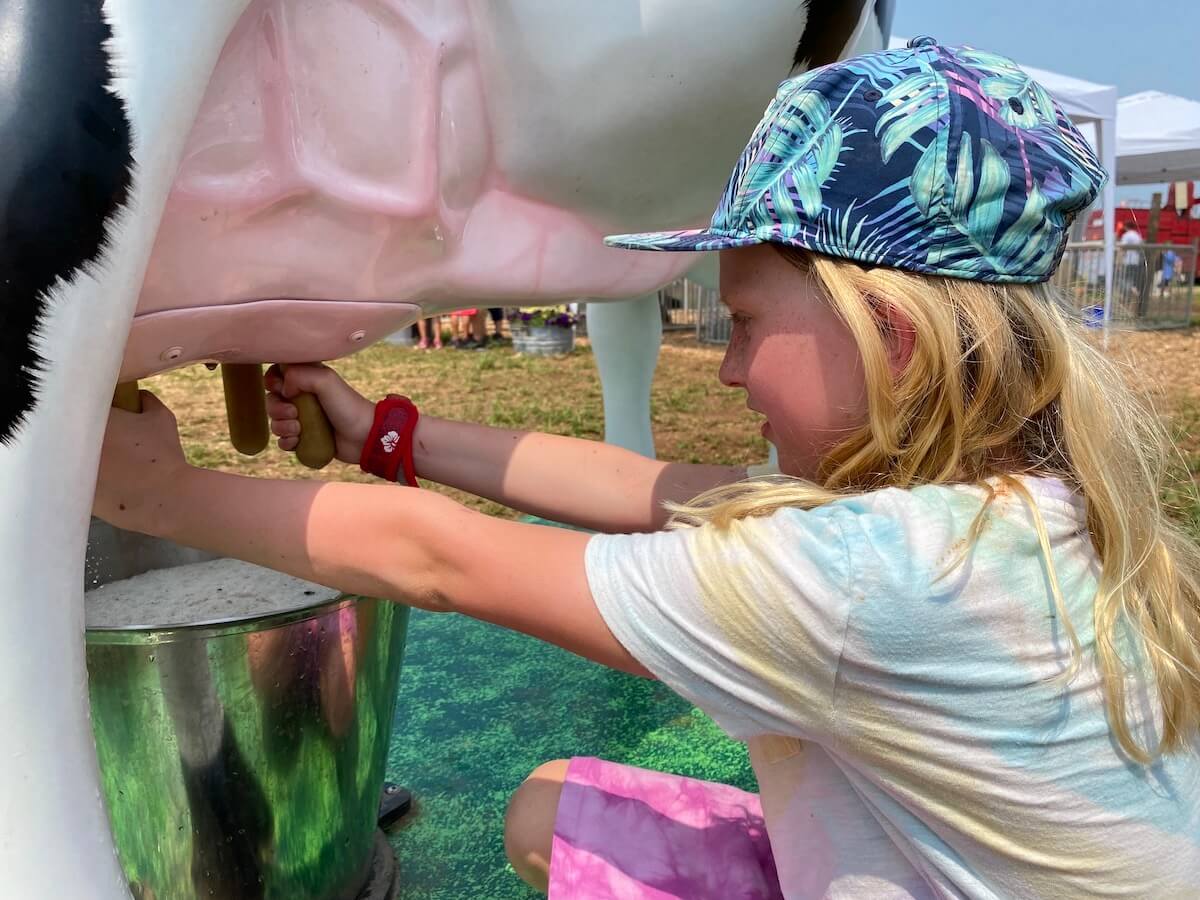
#image_title
#image_title
Producers display the diversity of their products at Farm Technology Days.
Wisconsin proudly bears the title “America’s Dairyland,” but farmers produce so much more than the milk and cheese the state is so well-known for.
Tuesday’s opening day of this year’s Wisconsin Farm Technology Days at a site just south of Eau Claire is evidence of the variety of products the agriculture sector is responsible for these days. The site’s Innovation Square near the center of the sprawling mix of tents, exhibits, and farm machinery is home to some of the larger world and Midwest producers of such products as horseradish, kidney beans, apples, and farm-raised Atlantic salmon.
The host of this year’s event, Huntsinger Farms, is an example of the state’s product diversity. The farm, founded in 1929 when Ellis Huntsinger bottled horseradish by hand in an old milk shed behind his house, has become the world’s largest producer and processor of horseradish. The company’s product is the No. 1 horseradish brand in the US and is sold worldwide.
Hunstinger’s products were certainly popular Tuesday, the first of the three-day farm technology days event. Throughout the morning a long line waited to try free mustard and horseradish samples at the company’s tent.
“Have you had horseradish before?” Thor Hermanson, a production data analyst with Huntsinger Farms, asked one customer before handing him a sample. “It’s got a lot of zip to it.”
An hour later, Hermanson shook his head and smiled as he looked out at the line of people wanting to try one of three flavors that had grown even longer.
“These samples are a big hit today, no doubt about it,” he said.
Other companies with a presence at farm technology days have found similar success growing and selling other agricultural products than milk and cheese, or crops such as corn and soybeans common to Wisconsin farm fields. For instance, Menomonie-based Chippewa Valley Bean has become a major producer of kidney beans and supplies them to Bush Brothers & Co. Similarly, Ferguson’s Orchards south of Eau Claire is one of the larger apple producers in the Midwest.
The expansion of those companies’ products and others from Wisconsin, such as cranberries, are one way to offset continued struggles many Wisconsin dairy and grain farmers face amid unpredictable prices they receive for their products, said Randy Romanski, secretary-designee of the state Department of Agriculture, Trade and Consumer Protection.
RELATED: Wisconsin’s Dairy Industry Needs More Than Band-Aid Solutions, Farmers Say
During an early morning tour of the event site Tuesday, Romanski said he was impressed by the number of major producers of products not typically associated with Wisconsin agriculture.
“You look at who’s here and it’s a lot more than just producers of milk and cheese,” Romanski told UpNorthNews shortly before the event’s opening ceremony. “Diversity is one shift we are seeing, and it is one way some farmers are able to continue to operate. When you have successful diversity, it enables agriculture to be more sustainable.”
Gov. Tony Evers attended the event’s opening, and during a short press conference afterward he spoke about the importance of Wisconsin’s agriculture industry’s diversification.
“The more diverse your products are, the more you’re going to be successful,” Evers said.
However, the governor said, to fully capitalize on diversified ag products, the state must improve its ability to process them. The coronavirus pandemic showed shortcomings in the meat-processing industry along with other supply chain disruptions.
Other Opportunities
Expanding trade opportunities is another way to help Wisconsin farmers, Romanski said. Wisconsin farm organizations said they hope President Joe Biden’s administration will improve trade opportunities for the state’s farmers.
US Trade Representative Katherine Tai visited western Wisconsin Friday to discuss trade issues with farmers. That visit comes as US officials navigate a formal trade dispute with Canada regarding dairy tariff-rate quotas.
New trade opportunities “would be a real opportunity” for the state’s farmers to expand existing markets and open new ones, Romanski said.
The 2021-23 state budget Evers signed into law earlier this month includes multiple funding initiatives for rural areas, including $125 million for expanding broadband internet service. Evers said he’s confident another $100 million or more in federal funding could be made available for further expansion, he said.
But the governor said Republican lawmakers who control the state Legislature stripped additional money from the budget that would have benefited rural regions. For instance, Evers’ proposed budget included $200 million for broadband.
“At the end of the day, we could have done more,” Evers said.

‘Enjoy Agriculture’
When Ken Traaseth was approached at a farm equipment show four years ago and asked if Huntsinger Farms would be interested in hosting the 2020 Wisconsin Farm Technology Days, he wasn’t sure what to think.
“At first you think, no, that would just be too much work,” Traaseth, the company’s vice president of agribusiness, recalled. “But you think that this could be good exposure for the company you work for, and good for agriculture.”
Traaseth approached one of Huntsinger’s owners, Eric Rygg, with the idea, and after giving it some thought, Rygg decided to do it. The company partnered with others and began the arduous undertaking of putting on an event expected to attract 50,000 people by the end of Thursday. More than 500 exhibitors from 26 states are at the event.
This year’s Farm Technology Days might never have happened. The coronavirus pandemic canceled the event, set to take place last summer. But in an unusual twist, no Farm Technology Days event had been scheduled for this year, and when the opportunity to host it arose, Huntsinger’s officials jumped at the opportunity.
“All of the work that happened to get ready for this event could have been for nothing,” Traaseth said. “But luckily it didn’t turn out that way. Instead you have all of these people out here today, getting a chance to learn about and enjoy agriculture.”
Politics

New Biden rule protects privacy of women seeking abortions
Under the new rules, state officials and law enforcement cannot obtain medical records related to lawful reproductive health care with the goal of...

Biden marks Earth Day by announcing $7 billion in solar grants
The Biden administration on Monday announced the recipients of its Solar For All Program, a $7 billion climate program that aims to lower energy...
Local News

Stop and smell these native Wisconsin flowers this Earth Day
Spring has sprung — and here in Wisconsin, the signs are everywhere! From warmer weather and longer days to birds returning to your backyard trees....

Your guide to the 2024 Blue Ox Music Festival in Eau Claire
Eau Claire and art go hand in hand. The city is home to a multitude of sculptures, murals, and music events — including several annual showcases,...




